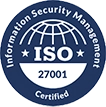ISO Standards Consulting: Drive your organization's excellence.
We help you implement and optimize the management system that improves your efficiency while complying with ISO standards.
100% success in certification audits. The success of our clients endorses us, as 100% of our clients successfully pass the audits.
More than 200 clients trust us with their certification.
Do you want to obtain an ISO Certification? We can help you achieve it.
We offer specialized consulting services for the implementation of management systems based on ISO standards. Our goal is to enhance the efficiency, quality, and profitability of your organization by applying internationally recognized standards.
We turn your challenges into opportunities.
What Management System do you want to certify?
Our experts will provide you with the necessary support to achieve certification in the ISO standard that best fits your goals and needs. Together, we will chart the path to certification.
ISO 9001
Quality Management Systems
ISO 14001
Environmental Management Systems
ISO 45001
Occupational Health and Safety Management Systems
ISO 27001
Information Security Management Systems
EMAS
Community Eco-Management and Audit Scheme (EMAS)
ISO 22000
Food Safety Management Systems
Why choose our ISO consulting service?
Compliance with Regulations
We ensure that your organization complies with the legal and regulatory requirements of the corresponding ISO standard.
Continuous Improvement
Through an excellence-oriented approach, we help you establish a culture of continuous improvement within your company.
Competitive Advantage
ISO certification enhances your reputation and sets you apart in the market, building trust with your customers and business partners.
Types of Consultancy.
Our experts will provide you with the necessary support to achieve certification in the ISO standard that best fits your goals and needs. Together, we will outline the strategy until certification is obtained.
Online Consultancy
Predesigned Procedures Template
Get predesigned procedures, along with a clear and precise guide for their implementation.
Our consultants will provide you with detailed instructions and validate your actions, ensuring that you are on the right path towards certification.
Active Consultancy
Document Proposal and Guides
Receive a document proposal and professional support in the development and implementation of the management system. Our team of consultants will assist you in creating a solid foundation for your management system, ensuring efficient and effective implementation.
Complete Consultancy
Management System Manager
Our consultant will be responsible for your company's management system, so you can save time and resources. They will take care of all the necessary tasks to achieve certification, providing you with a comprehensive solution.
How does ISO Consultancy work?
We develop your path to ISO excellence: Our 4-step audit process
1
Initial assessment
We analyze your organization and evaluate your current situation in relation to the selected ISO standard requirements."
2
Design of the implementation plan
We create a personalized and detailed plan to implement the necessary changes and obtain certification.
3
Accompaniment and monitoring
We provide continuous support throughout the process, ensuring that you achieve and maintain ISO excellence standards in your company.
4
Audit and certification:
We prepare your organization for the final audit and guide you through the certification process.
Trust in our experience and let us guide you to success in implementing ISO standards.
Testimonials
We're not just saying it ourselves, our satisfied customers speak for themselves. We've helped over 200 companies improve their legal compliance.
Discover how our audits have transformed the daily operations of organizations like yours.
Do you need help? Get real-time assistance.
Get support from our agents through:
Chat
Phone
First-rate security
We take your security seriously and take measures to ensure that your data remains secure.

Microsoft Partners

ISO 27001 Certified

GDPR
Compliand
More than 1.200 clients trust us.
Do you want to know how CTAIMA can help your company?
Fill out this form and we will get in touch with you.
DATA PROTECTION INFORMATION OF CTAIMA GROUP. Purposes: Respond to your requests and send you commercial information about our products and services, including electronically. Rights: You can withdraw your consent at any time, as well as access, rectify, delete your data and other rights at delegado-datos@ctaima.com. Additional Information: You can find more information at the Privacy Policy link.
